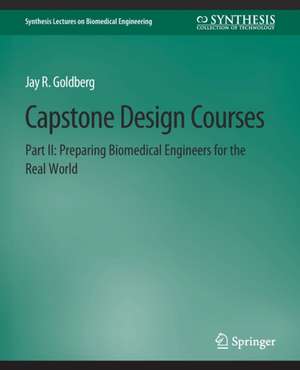Capstone Design Courses, Part II: Preparing Biomedical Engineers for the Real World: Synthesis Lectures on Biomedical Engineering
Autor Jay Goldbergen Limba Engleză Paperback – 25 sep 2012
Din seria Synthesis Lectures on Biomedical Engineering
- 17%
 Preț: 362.03 lei
Preț: 362.03 lei - 15%
 Preț: 522.24 lei
Preț: 522.24 lei - 5%
 Preț: 364.74 lei
Preț: 364.74 lei - 5%
 Preț: 525.89 lei
Preț: 525.89 lei - 15%
 Preț: 636.80 lei
Preț: 636.80 lei -
 Preț: 382.95 lei
Preț: 382.95 lei -
 Preț: 268.83 lei
Preț: 268.83 lei -
 Preț: 260.77 lei
Preț: 260.77 lei -
 Preț: 266.32 lei
Preț: 266.32 lei -
 Preț: 265.18 lei
Preț: 265.18 lei -
 Preț: 262.47 lei
Preț: 262.47 lei -
 Preț: 204.76 lei
Preț: 204.76 lei -
 Preț: 268.66 lei
Preț: 268.66 lei -
 Preț: 262.47 lei
Preț: 262.47 lei -
 Preț: 321.54 lei
Preț: 321.54 lei -
 Preț: 192.05 lei
Preț: 192.05 lei -
 Preț: 261.32 lei
Preț: 261.32 lei -
 Preț: 261.53 lei
Preț: 261.53 lei -
 Preț: 206.84 lei
Preț: 206.84 lei -
 Preț: 349.36 lei
Preț: 349.36 lei -
 Preț: 260.95 lei
Preț: 260.95 lei -
 Preț: 204.76 lei
Preț: 204.76 lei -
 Preț: 391.02 lei
Preț: 391.02 lei -
 Preț: 268.83 lei
Preț: 268.83 lei -
 Preț: 205.92 lei
Preț: 205.92 lei -
 Preț: 382.57 lei
Preț: 382.57 lei -
 Preț: 346.48 lei
Preț: 346.48 lei -
 Preț: 264.41 lei
Preț: 264.41 lei -
 Preț: 384.48 lei
Preț: 384.48 lei -
 Preț: 259.04 lei
Preț: 259.04 lei -
 Preț: 260.95 lei
Preț: 260.95 lei -
 Preț: 261.32 lei
Preț: 261.32 lei -
 Preț: 158.66 lei
Preț: 158.66 lei -
 Preț: 267.86 lei
Preț: 267.86 lei -
 Preț: 207.65 lei
Preț: 207.65 lei -
 Preț: 205.92 lei
Preț: 205.92 lei -
 Preț: 268.66 lei
Preț: 268.66 lei -
 Preț: 322.31 lei
Preț: 322.31 lei -
 Preț: 205.70 lei
Preț: 205.70 lei -
 Preț: 226.22 lei
Preț: 226.22 lei - 15%
 Preț: 404.48 lei
Preț: 404.48 lei -
 Preț: 263.28 lei
Preț: 263.28 lei -
 Preț: 383.71 lei
Preț: 383.71 lei -
 Preț: 273.45 lei
Preț: 273.45 lei -
 Preț: 207.06 lei
Preț: 207.06 lei -
 Preț: 263.06 lei
Preț: 263.06 lei -
 Preț: 260.77 lei
Preț: 260.77 lei -
 Preț: 205.33 lei
Preț: 205.33 lei
Preț: 206.84 lei
Nou
Puncte Express: 310
Preț estimativ în valută:
39.59€ • 43.02$ • 33.28£
39.59€ • 43.02$ • 33.28£
Carte tipărită la comandă
Livrare economică 22 aprilie-06 mai
Preluare comenzi: 021 569.72.76
Specificații
ISBN-13: 9783031005244
ISBN-10: 3031005244
Pagini: 83
Ilustrații: XIII, 83 p.
Dimensiuni: 191 x 235 mm
Greutate: 0.18 kg
Editura: Springer International Publishing
Colecția Springer
Seria Synthesis Lectures on Biomedical Engineering
Locul publicării:Cham, Switzerland
ISBN-10: 3031005244
Pagini: 83
Ilustrații: XIII, 83 p.
Dimensiuni: 191 x 235 mm
Greutate: 0.18 kg
Editura: Springer International Publishing
Colecția Springer
Seria Synthesis Lectures on Biomedical Engineering
Locul publicării:Cham, Switzerland
Cuprins
The Myth of the "Industry-Ready" Engineer.- Recent Trends and the Current State of Capstone Design.- Preparing Students for Capstone Design.- Helping Students Recognize the Value of Capstone Design Courses.- Developing Teamwork Skills.- Incorporating Design Controls.- Learning to Identify Problems, Unmet Needs, and New Product Opportunities.- Design Verification and Validation.- Liability Issues with Assistive Technology Projects.- Standards in Capstone Design Courses and the Engineering Curriculum.- Design Transfer and Design for Manufacturability.- Learning from other Engineering Disciplines: Capstone Design Conferences.- Maintaining a Relevant, Up-to-Date Capstone Design Course.- Active Learning in Capstone Design Courses.- Showcasing Student Projects: National Student Design Competitions.- Managing Student Expectations of the "Real World".- Career Management and Professional Development.- Conclusion.
Notă biografică
Jay R. Goldberg is an associate professor of biomedical engineering at Marquette University and director of the Healthcare Technologies Management program at Marquette University and the Medical College of Wisconsin (Milwaukee). He teaches courses involving project management, new product development, and medical device design. His experience includes development of new products in urology, orthopedics, gastrointestinal, and dentistry. He is a licensed professional engineer in Illinois and Wisconsin. Dr. Goldberg earned a Bachelor of Science degree in general engineering from the University of Illinois and a Master of Science degree in bioengineering from the University of Michigan. He has a Master of Science degree in engineering management and a Doctor of Philosophy degree in biomedical engineering from Northwestern University. He holds six patents for urological medical devices. Dr. Goldberg also serves as chairman of the Subcommittee on Urological Devices and Materials of the American Society for Testing and Materials. Before moving into academia, he was director of technology and quality assurance for Milestone Scientific Inc. (Deerfield, IL), a start-up dental product company. Before that, he worked for Surgitek (Racine, WI), Baxter (Deerfield, IL), and DePuy (Warsaw, IN). He is a member of the Biomedical Engineering Society, the National Society of Professional Engineers, and the Association for the Advancement of Medical Instrumentation and a consultant to the Gastroenterology and Urology Therapy Device Panel of the Medical Device Advisory Committee of the Food and Drug Administration. Dr. Goldberg is a cocreator of the Biomedical Engineering Innovation, Design, and Entrepreneurship Alliance National Student Design Competition and writes a quarterly column on senior design for IEEE-EMBS magazine.
